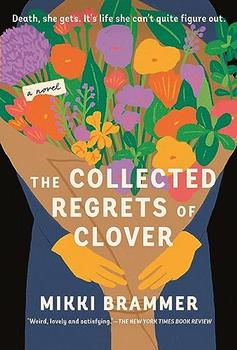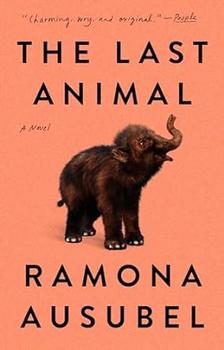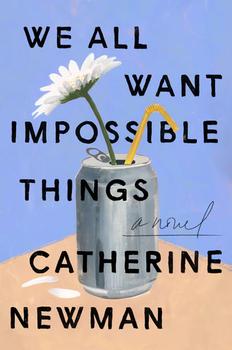Summary | Excerpt | Reading Guide | Reviews | Beyond the book | Read-Alikes | Genres & Themes | Author Bio

A Novel
by Mikki BrammerClover Brooks, the reclusive heroine of Australian journalist Mikki Brammer's first novel, is not your typical 36-year-old. She was raised by her grandfather, a biology professor, and 13 years after his death still lives in his rent-controlled, oddity-crammed New York City apartment. Her regular companions are her dog and cats and her one friend, 87-year-old Leo, a longtime neighbor with whom she plays mah-jongg. She has never been romantically involved with anyone; her fantasies are based on the romcoms she binge-watches and the perfect relationship she imagines for her neighbors across the street, a couple whom she spies on with binoculars. She avoids making lasting connections with other people, so her job – which entails only brief acquaintanceship – is perfect for her.
You see, Clover is a death doula (see Beyond the Book), meeting terminal patients in their final weeks or days and helping them to mentally and practically prepare for death. "New York is a city of lonely people full of regrets. It's my job to make their final moments a little less lonesome," she explains in the book's opening pages. She believes half her clients would be totally alone if she wasn't there. After each death (97 and counting), she records the dying person's last words in one of three categorized notebooks: REGRETS, ADVICE, or CONFESSIONS. She also tries to make amends for the regrets – the small, concrete ones, anyway, such as ice skating in Central Park on behalf of Una, who wished she'd gotten around to doing so.
Yet Clover has plenty of regrets of her own. How does a young woman end up so melancholy and mired in death? The obsession started early: "The first time I watched someone die, I was five," the novel opens. Her kindergarten teacher had a heart attack while reading to the children from Peter Rabbit. A year later, her parents died in a boating accident in China, and she moved from Connecticut to live with her grandfather. By her early 20s, she had completed a Master's degree in thanatology (the study of death) and traveled everywhere from Peru to Japan to learn about death traditions. She was in Cambodia when news came of her grandfather's death, and she has never forgiven herself for letting him die alone.
Through flashbacks, Brammer convincingly explores her main character's psychology. Clover feels that every time she's pursued a relationship, whether with a friend or a love interest, it has backfired on her. These excruciating scenes will resonate with anyone who's been humiliated by unrequited admiration. Everyone she's loved has left her, she thinks, so it's safest to be alone and not let anyone in. "My emotions … were always neatly tucked away," she acknowledges. "Observing the world, rather than engaging with it" is her strategy.
Over the course of the novel, a couple of incidents force her to rethink her approach. First, a new neighbor, Sylvie, moves in upstairs, and Clover makes her first real (age-appropriate) friend. Second, romance seems to come her way in the form of Sebastian. Can one call it a meet-cute when the characters meet at a death café (a casual get-together where people can talk about death over refreshments)? Either way, it's the start of something personal as well as professional when Sebastian hires Clover to work with his grandmother, Claudia Wells, a pioneering female photojournalist now dying of cancer in a family that has never known how to talk about death. As Claudia reviews her life and tells the story of her lost soul mate, Hugo, Clover realizes that she cannot give up on the chance of true love for herself, and even embarks on a long-shot road trip to try to reunite Claudia with Hugo.
The pacing of the novel feels a little off; the road trip, which from the jacket description would appear to be a major element of the plot, isn't so much as floated until well over halfway through. Moreover, the complications it brings about are smoothed over too quickly. There is also, at this point, the introduction of a new character who seems too good to be true – thoughtful, kind, sensitive, observant; saying all the right things.
Still, it is touching to see Clover's gradual transformation as she agrees to things outside of her comfort zone. She starts off as an Eleanor Oliphant type of character but slowly gets in touch with her emotions as she opens herself to new experiences. Her New York City, as portrayed by Brammer, is a joyous place of dog parks and coffee shops and bookstores, and these small pleasures help counterbalance Clover's regret and sadness.
By the end, Clover is contemplating a new career that will let her travel the world again, with less of a focus on death. I've been an obsessive consumer of illness and death narratives for years, but I appreciate that for others it may be a subject to avoid. Be assured: there is nothing depressing about this novel. Its message of honoring the dead yet seizing the day resonates widely. While her grandfather and others she lost will always be with her, Clover comes to see death in a new way. Like dust, she posits, "grief is just love looking for a place to settle."
![]() This review was originally published in The BookBrowse Review in July 2023, and has been updated for the
June 2024 edition.
Click here to go to this issue.
This review was originally published in The BookBrowse Review in July 2023, and has been updated for the
June 2024 edition.
Click here to go to this issue.

If you liked The Collected Regrets of Clover, try these:

by Ramona Ausubel
Published 2024
A playful, witty, and resonant novel in which a single mother and her two teen daughters engage in a wild scientific experiment and discover themselves in the process, from the award-winning writer of Sons and Daughters of Ease and Plenty

by Catherine Newman
Published 2023
For lovers of Meg Wolitzer, Maria Semple, and Jenny Offill comes this raucous, poignant celebration of life, love, and friendship at its imperfect and radiant best.
Discovery consists of seeing what everybody has seen and thinking what nobody has thought.
Click Here to find out who said this, as well as discovering other famous literary quotes!
Your guide toexceptional books
BookBrowse seeks out and recommends the best in contemporary fiction and nonfiction—books that not only engage and entertain but also deepen our understanding of ourselves and the world around us.